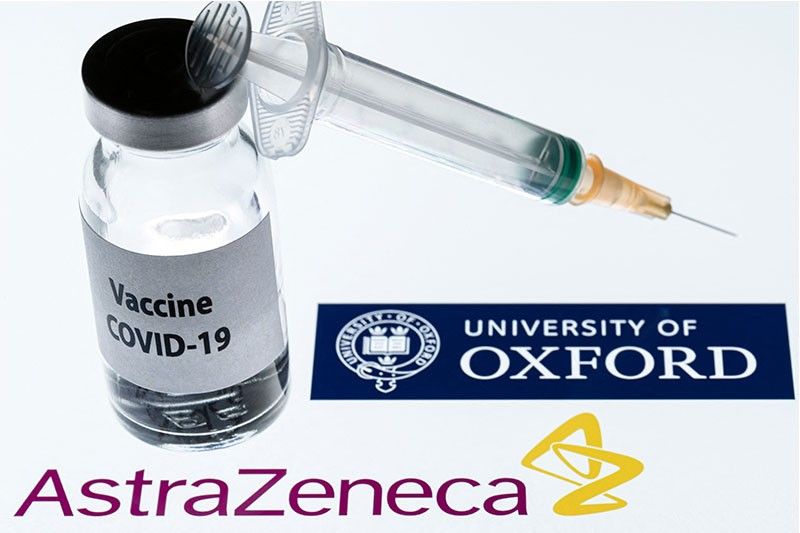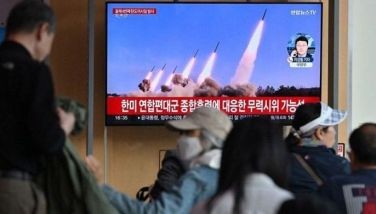Major EU nations halt AstraZeneca as WHO says it is safe

GENEVA, Switzerland — The EU's largest countries joined a stream of states halting their rollouts of AstraZeneca jabs on Monday over blood clot fears, as the World Health Organization and Europe's medicines watchdog insisted it was safe to use.
Both organisations will hold special meetings this week after a host of countries said they would stop using the vaccine pending further review.
The fresh suspensions were a major blow to a global immunisation campaign that experts hope will help end a year-long pandemic that has already killed over 2.6 million people and decimated the global economy.
The three largest EU countries — Germany, Italy and France — all paused rollouts on Monday and were later joined by Spain, Portugal and Slovenia.
The suspensions were not limited to Europe, with Indonesia also announcing a delay to its rollout of the jab, which is cheaper than its competitors and was billed as the vaccination of choice for poorer nations.
But the WHO insisted countries should keep using the vaccine, adding that it had scheduled a meeting of its experts on Tuesday to discuss the vaccine's safety.
"We do not want people to panic and we would, for the time being, recommend that countries continue vaccinating with AstraZeneca," WHO chief scientist Soumya Swaminathan said.
"So far, we do not find an association between these events and the vaccine," she said, referring to reports of blood clots from several countries.
The European Medicines Agency (EMA), which is holding a special meeting on Thursday, echoed the WHO's calls for calm and said it was better to get the vaccine than not.
"The benefits of the AstraZeneca vaccine in preventing Covid-19, with its associated risk of hospitalisation and death, outweigh the risks of side effects," the agency said in a statement Monday.
The UK has doled out more than 11 million doses of the AstraZeneca jab — more than the entire EU — apparently without major problems.
'Waste of money'
As policymakers struggled to manage vaccine rollouts, Estonia's Prime Minister Kaja Kallas announced she had tested positive — underlining the continuing threat of the contagion.
She tweeted that she would continue to work virtually and the government added that she had "a low fever but no other symptoms and is generally feeling well".
Italy provided another reminder that the pandemic was far from over, most of the country re-entering lockdown on Monday with schools, restaurants, shops and museums closed.
The streets of central Rome were quiet on Monday morning and businesses already battered by a year of anti-virus measures braced for another hit.
"I'm staying open because I'm selling cigarettes, otherwise it would not be worth it," said Rome coffee shop owner Carlo Lucia.
"It's just a waste of money."
Meanwhile, intensive care doctors in Germany issued an urgent appeal for new restrictions to avoid a third wave as the British variant takes hold there.
Understanding Covid origins
More than 350 million vaccines have now been administered globally, but poorer countries are still lagging far behind.
Brazil, which has suffered one of the world's worst outbreaks, is attempting to redress the balance, announcing the order of more than 138 million jabs on Monday.
The European Union has approved four jabs so far, and is monitoring others — including Russia's Sputnik V vaccine.
The Russian developers said on Monday they had reached production agreements in key European countries.
The news came as the WHO said it had raised nearly $250 million in the past year from individual donors and companies towards battling the pandemic.
WHO chief Tedros Adhanom Ghebreyesus said the fund's success proved "what we can accomplish together in times of need".
More than a year after his organisation declared the coronavirus threat a pandemic, a much-anticipated report on the origins of Covid-19 is expected to be released this week.
The report follows a fact-finding mission of international experts assembled by the WHO, which travelled in January to the Chinese city of Wuhan where the virus first emerged in December 2019.
"Within the next few years, we're going to have real significant data on where this came from and how it emerged," said British zoologist Peter Daszak, one of the team members. — with AFP bureaus
Pharma giants Sanofi and GSK said on July 29, 2020, that they have agreed to supply Britain with up to 60 million doses of a potential COVID-19 vaccine. The agreement covers a vaccine candidate developed by France's Sanofi in partnership with the UK's GSK and is subject to a "final contract."
This thread collects some of the major developments in the search for a vaccine to ease the new coronavirus pandemic. (Main photo by AFP/Joel Saget)
As negotiations towards a new pandemic treaty pick up pace, observers warn of watered-down efforts to ensure equitable access to the medical products needed to battle future Covid-like threats.
Shaken by the pandemic, the World Health Organization's 194 member states are negotiating an international accord aimed at ensuring countries are better equipped to deal with the next catastrophe, or even prevent it altogether.
The process is still in the early stages, with the aim of reaching an agreement by May 2024.
But critics warn that revisions being made to the preliminary negotiating text are weakening the language -- notably in a key area aimed at preventing the rampant inequity seen in access to vaccines and other medical products during the Covid pandemic.
"I think it is a real step backwards," Suerie Moon, co-director of the Global Health Centre at the Geneva Graduate Institute, told AFP. — AFP
Africa's first mRNA vaccine hub is ceremonially launched on Thursday to acclaim from the UN's global health chief, who hailed it as a historic shift to help poor countries gain access to life-saving jabs.
The facility was set up in the South African city of Cape Town in 2021 on the back of the success of revolutionary anti-Covid vaccines introduced by Pfizer/BioNTech and Moderna.
"This precious project... will bring a paradigm shift in addressing the serious problem we faced, the equity problem, during the pandemic, so (that) it's not repeated again," World Health Organization (WHO) head Tedros Adhanom Ghebreyesus tells a media briefing to mark the inauguration. — AFP
China has approved its first locally developed messenger RNA (mRNA) vaccine against Covid-19, its manufacturer said Wednesday, months after the relaxation of strict Covid-zero regulations sparked a surge in cases.
The vaccine, developed by CSPC Pharmaceutical Group Ltd, has been approved for "emergency use" by Beijing's health regulator, the company said in a statement.
It showed high efficacy in a trial in which it was used as a booster shot for people who have been given other types of vaccines, the company added, without offering further details. — AFP
COVID-19 vaccine maker Novavax raises doubts about its ability to continue its business, announcing plans to cut spending after struggles in rolling out its coronavirus jab.
Shares of Novavax plummeted 25 percent in extended trading, after the company reported fourth-quarter earnings that missed analyst estimates.
While the firm should have enough money to fund operations, the situation is "subject to significant uncertainty," it says in a statement. — AFP
The protection against Covid-19 from being previously infected lasts at least as long as that offered by vaccination, one of the largest studies conducted on the subject says.
Ten months after getting Covid, people still had an 88% lower risk of reinfection, hospitalisation and death, according to the study published in the Lancet journal.
That makes this natural immunity "at least as durable, if not more so" than two doses of Pfizer or Moderna's vaccines, the study says.
The authors nevertheless emphasized that their findings should not discourage vaccination, which remains the safest way to get immunity. — AFP
- Latest
- Trending

































